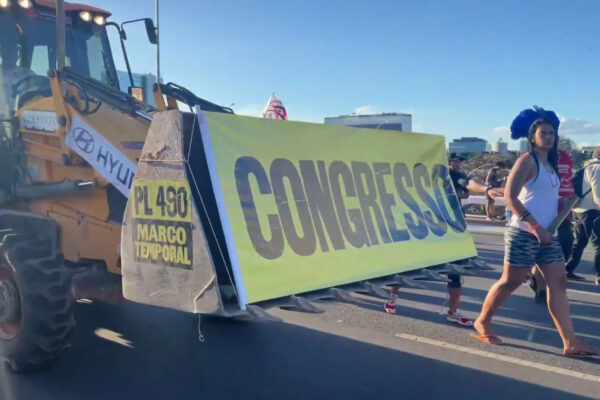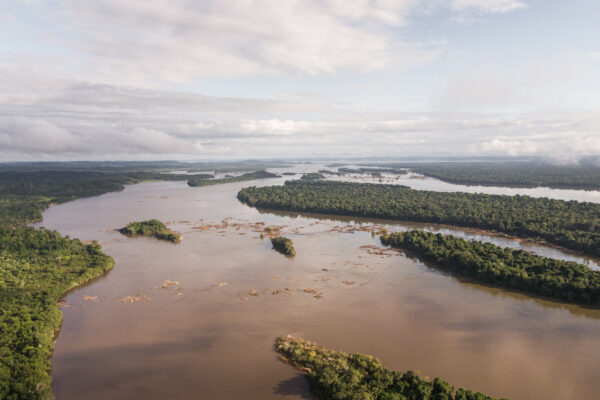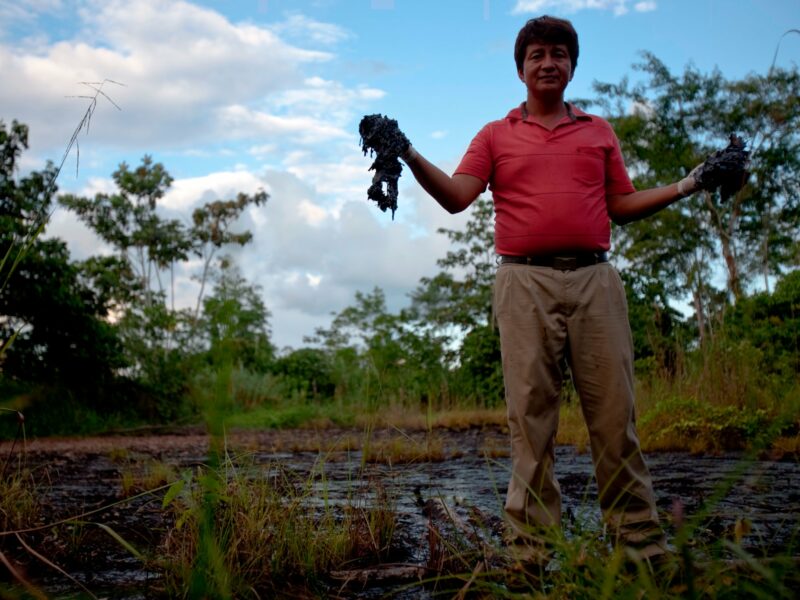A class-action lawsuit against oil giant ChevronTexaco opened today in a small, cinderblock courthouse in a frontier oil town in the Ecuadorian rainforest, charging the company with despoiling the environment with millions of gallons of spilled crude oil during the 1970s and ’80s.
International activists who have been aiding the plaintiffs – 30,000 Amazonian peasants and Indians – say the case could be a milestone in ensuring U.S.-based companies conduct their foreign operations responsibly.
“It’s historic,” said Shannon Wright, associate director of Amazon Watch, a San Francisco nonprofit. “What happens in this one-room courthouse could be a turning point for indigenous people trying to protect their land and for multinational companies looking to avoid responsibility overseas.”
ChevronTexaco’s lawyers, however, say there is no case and will ask the judge today to dismiss the suit.
The company contends that its subsidiary, Texaco Petroleum Corp., undertook a $40 million cleanup in 1998 and is no longer legally responsible for the environmental conditions in Ecuador.
“We don’t feel the plaintiffs have ever provided any substantiated evidence to support their claims,” said Maripat Sexton, a spokeswoman for ChevronTexaco in Houston. “In 1998, the Ecuadoran government, PetroEcuador and five municipalities released the company from all liabilities and obligations related to the oil operations.” PetroEcuador is the national oil company.
But Humberto Piaguaje, 39, a member of the Secoya nation and a village schoolteacher who lives beside the Aguarico River, has experienced firsthand the toxic consequences of oil exploration.
For 30 years, he said, residents of the jungle region have been dying of cancer, hepatitis and skin infections. People lack clean water for drinking and bathing. And widespread deforestation has encroached on traditional fishing and hunting grounds.
He feels ChevronTexaco does bear responsibility for the mess, along with the national oil company, which continues drilling in the Amazon. The trial, he said, is his country’s chance to prove that the rule of law will protect ordinary citizens.
“I’m a little nervous, but I also have hope,” Piaguaje said in San Francisco on Monday. “This is the moment when Ecuador needs to demonstrate that there is justice. But I know the company is very powerful. If it can influence the judge, we’ll be worse off than we were.”
Piaguaje was visiting the Bay Area to raise awareness about the case, particularly in the San Ramon Valley, where ChevronTexaco headquarters is located, and where residents plan a protest today. He returned to Ecuador Monday night to attend the trial in the Amazon town of Lago Agrio, where his father is scheduled to testify.
He and the other plaintiffs have waited more than a decade for their day in court. They are seeking a thorough cleanup, detailed monitoring of the long- term health effects of the contamination and damages that could total more than $1 billion. The trial is expected to last six days, and the judge must return a verdict within three months.
The original suit alleges that Texaco dumped 18 million gallons of toxic waste into hundreds of unlined open pits, estuaries and rivers between 1964 and 1992, exposing residents to cancer-causing pollutants. Environmental activists say crude oil-laden wastewater should have been reinjected deep underground, as has long been standard practice in the industry.
But ChevronTexaco spokeswoman Sexton said the use of waste pits was legal and common.
“Especially at the time, pits were an acceptable method of dealing with produced water,” she said. “It’s still allowable in many countries, including in parts of the United States.”
The plaintiffs had originally hoped the case would be tried in the United States, but a federal appeals court in New York ruled last year that the matter should be decided in Ecuador. But in a landmark decision, the court also warned that any judgment against the oil company by the Ecuadoran court would be enforced in the United States.
“A precedent has already been set in a U.S. court saying we will enforce a judgment made in another country against a U.S. company,” said Wright. “If the judgment is favorable to the plaintiffs, then it takes it to a whole new level.”
E-mail Tyche Hendricks at thendricks@sfchronicle.com.













